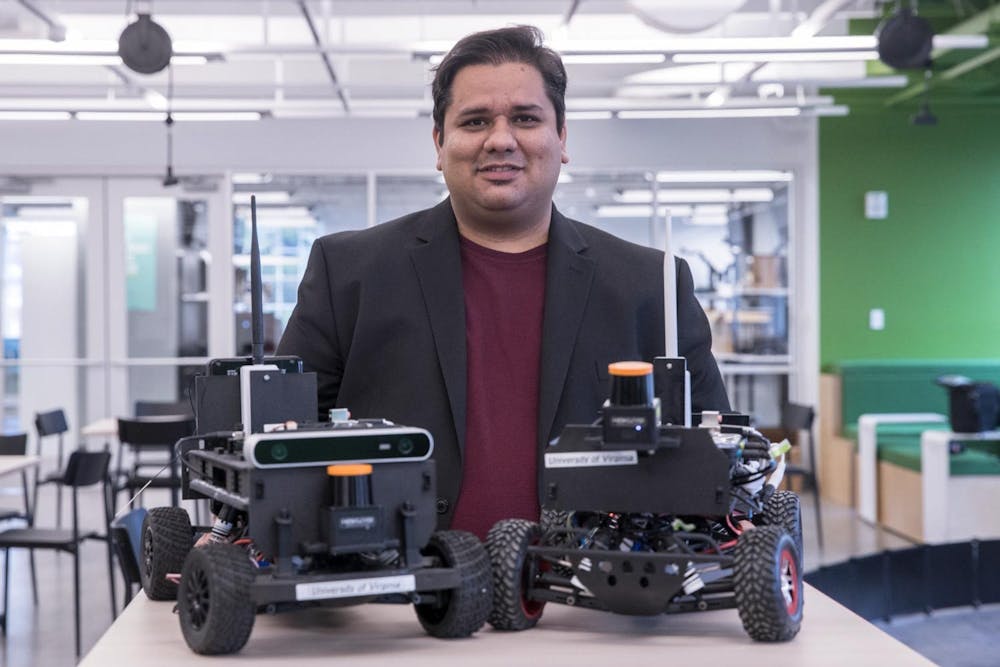A new organization at the University, focusing on designing and building a fully autonomous electric go-kart, has just received $50,000 from the Jefferson Trust to start building the club. Cavalier Autonomous Racing will be mentored by Madhur Behl — assistant professor of computer science, engineering systems and environment — and he hopes that the organization can provide students interested in the areas of robotics and autonomy — the ability for a robot to understand its environment and make decisions on its own — an avenue for learning valuable skills. The club’s efforts will culminate in a demonstration at the Indianapolis Motorsport Speedway during the summer or fall of 2020, and Behl hopes that the team of students will use this event as a milestone to potentially partake in the full-scale autonomous car racing competition known as Indianapolis 500 in 2021.
Behl explained the motivation behind the club stems from his long experience with autonomous car racing. For the last four years, he has been leading an open-source project to build what he calls F1/10 cars, which are one-tenth the scale of Formula One race cars — single-seat and open-cockpit cars designed for attaining high speeds meant for racing. According to Behl, the next logical step for these race cars would be to scale-up from F1/10 and create go-karts, which would be approximately six feet by four feet in size.
Behl also teaches an undergraduate computer science elective course where approximately 50 students can learn the fundamental principles of autonomy — perception, planning and control — as well as apply this theory to race F1/10 cars. In addition, he mentioned that some students outside of the Engineering School were interested in his class and that a University-wide organization would make the activity more accessible.
Behl’s interest in autonomous race cars stems from his research, which focuses on increasing the safety of self-driving cars. He explained the seemingly counterintuitive connection between racing and safety.
“The idea is … when a collision is imminent or some car just weaves in front of you at the last second, then your autonomous vehicle has to have the ability to break aggressively or maneuver aggressively at the limits of its agility,” Behl said. “So for that split second, it has to become like a race car.”
To ensure the club could be successful, Behl submitted a proposal to the Jefferson Trust in late 2019, requesting $50,000.
"With an activity like autonomous racing, the first year is typically the most expensive year because you are buying parts, and you're putting this together physically," Behl said. He also added that when building race cars, it is essential to have spare parts while testing, which adds to the overall cost.
In January, Behl was notified that he was a finalist, and at the end of that month, he pitched his idea to about 40 members of the trust’s board. The board agreed to provide the entire amount he requested.
Behl plans to host interest meetings after spring break for students both in and out of the Engineering School. He hopes to attract a variety of students who can help with aspects outside of the construction of the go-kart itself, including graphic design, video documentation of the project and operations management.
The club will begin meeting in March and will continue design and development into the summer and fall of the next school year to demonstrate the go-kart at the Indianapolis Motorsport Speedway.
Mert Karakas, fourth-year Engineering student and teaching assistant for Behl’s F 1/10 class, expressed his excitement about the club in relation to closing the gap between the University and other schools in the robotics arena.
“U.Va. [does not have] a Formula One team … while other schools [like] Virginia Tech have a lot more established racing teams,” Karakas said. “I feel like having a club that is dedicated to building the car and racing it would be much more impactful.”
Sandesh Banskota, fourth-year Engineering student and teaching assistant for Behl, explained that he took Behl’s F1/10 class as a way to both learn and apply robotics theory. He believes the new club will take that application step even further.
“I think how applicable, how realistic it is — I think that's one thing that will really set this club apart,” Banskota said.
Karakas said that he hopes to be a part of the team until he graduates, and Banskota said that if he happens to stay in Charlottesville over the summer, he would work with the team.
Behl feels the club will act as a catalyst for opening career paths to students interested in robotics and autonomy, teaching them skills that could be applied broadly.
“If you look at any automotive manufacturer today, they have a self-driving car research division — clearly, there is a need for individuals who are trained in this very specialized area of autonomy,” Behl said. “If you know about the principles of perception, planning and control, you can apply it to any autonomous agent, whether it be drones, platoons of trucks or ships or, in my case, [an] autonomous race car.”







